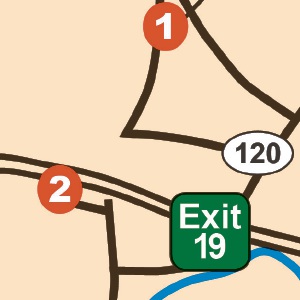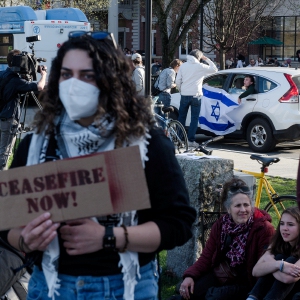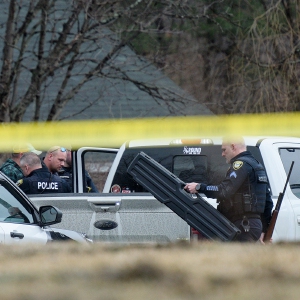Voters in Royalton and Bethel easily approve school budget
| Published: 03-05-2024 4:54 PM |
BETHEL — It’s a rare annual meeting at which the controversial issues are raised in the “other business” portion just before adjournment.
After passing a budget of nearly $14.4 million by a vote of 98-28 on Monday evening, voters from Bethel and Royalton, the two towns of the White River Valley Unified District, listened as two former School Board members laid out key policy questions — voting representation within the White River Valley Supervisory Union, and ending public funding for private schools.
Both issues are thorny ones for the 10-town school union, within which the two towns’ unified district is the largest and the only one with a public high school.
(In Vermont, a supervisory union often comprises multiple school districts and oversees the provision of transportation, special education and the hiring of administrators, among other functions.)
Tom “Geo” Honigford, who served on the Royalton School Board before the unified district was formed, noted that the Bethel-Royalton district has around 40% of the supervisory union’s student population, but only around 18% of the voting representation.
The supervisory union gives a smaller district such as Strafford, which has 10% of the students, the same voting power that the WRV district holds, Honigford noted.
When the new district was formed, five years ago, “We went to the other supervisory union districts and said, ‘Can we change this and have it be more equitable?’ ” Honigford said.
The other districts opted to keep voting representation evenly divided among districts regardless of size.
Article continues after...
Yesterday's Most Read Articles
 Lebanon moves forward with plans for employee housing
Lebanon moves forward with plans for employee housing
 At Dartmouth, hundreds protest ongoing war in Gaza and express support for academic freedom
At Dartmouth, hundreds protest ongoing war in Gaza and express support for academic freedom
 Police break up protest at Dartmouth College, 90 arrested
Police break up protest at Dartmouth College, 90 arrested
 Man tied to Lebanon school lockdowns pleads not guilty to charges
Man tied to Lebanon school lockdowns pleads not guilty to charges
At the time, it would have taken a majority vote in the supervisory union to make a change, but the law has since been amended, allowing one district within a supervisory union to petition the State Board of Education to reapportion voting representation.
“Does our board recognize that this is an issue, and if so, what are you doing to address it?” Honigford asked.
With the new law in play, the supervisory union board is discussing it, Andrew Jones, chairman of the unified district board, said in response. “We’d like to try to come to a consensus on representation.”
Next, Greg Hughes, a former longtime member of the Bethel School Board before the merger, read a prepared statement urging voters in Bethel and Royalton to ask state lawmakers to end the payment of public tuition to private schools.
The U.S. Supreme Court’s 2022 decision in Carson v. Makin held that a state need not pay public funds to private schools, but once it does it cannot exclude religious schools. Since then, the administration of Republican Gov. Phil Scott has complied, and districts that offer school choice have paid tuition funds to religious schools that exclude students based on belief.
This runs counter to the “compelled support clause” in the Vermont Constitution, which both allows people to worship as they please, but also “restricts the flow of taxpayers’ dollars to support religious institutions,” Hughes said.
The state Legislature took up a bill last year that would have curtailed this practice by requiring districts that do not operate their own schools to designate three public schools, including the state’s four traditional academies, Thetford Academy, Burr and Burton, Lyndon Institute and St. Johnsbury Academy, for their students to attend. Under the current practice, districts with school choice allow state education money to travel anywhere, and tuition payments have gone to schools both out of state and out of the country.
Passing a bill to designate public schools “would keep education dollars in Vermont, help pay our teachers’ salaries, help us to maintain infrastructure and help to support education that is available to all our children,” Hughes said.
He noted that this would affect a small percentage of Vermont students, but could have “dire implications for some private schools that would likely be forced to close their school. However, the threat of a private school closing is not a reason to keep sending that school money. Many public schools, such as Rochester and Chelsea high schools, have closed due to lack of enrollment, and for the same reason, some private schools will need to close, also.”
“I would urge you,” Hughes concluded, “to contact your legislators with the simple message that we need to follow our constitutional mandates and stop using public money to support private schools.”
The school district board did not speak to Hughes’ suggestion. Since every other district in the White River Valley Supervisory Union has school choice for at least some grades, advocacy of designating public schools could create a political rift.
After a presentation by Jones, the budget passed comfortably in a secret ballot requested by citizens. While the budget is more than 10% higher than last year, including $450,000 in new positions, it is projected to result in a slight tax decrease for Royalton of around 2 cents per $100 of assessed value, and a slight increase for Bethel of around 2.5 cents per $100.
The combination of higher spending and moderate tax impact is attributable to Act 127, which changed the funding weights in the state’s school finance system. Where the White River Valley Unified District had 566 equalized pupils for funding purposes in the current year, it would have 1,095 next year. The steep rise in equalized pupils is due to a new formula that assigns greater funding to students of low income, in rural districts, in small schools and in the secondary grades.
Voters also approved putting $900,000 in surplus funds into a reserve fund for upcoming construction projects, including a proposed high school performing arts center.
Voting for School Board was slated for Tuesday, with Royalton member Peggy Ainsworth running unopposed for a new three-year term. Julie Hinman, a longtime teacher, is mounting a write-in campaign for an open seat from Bethel.
The meeting brought out 63 of Royalton’s 2,042 registered voters, and 70 of the roughly 1,235 voters in Bethel.
Alex Hanson can be reached at ahanson@vnews.com or 603-727-3207.

 Dartmouth graduate student-workers go on strike
Dartmouth graduate student-workers go on strike
